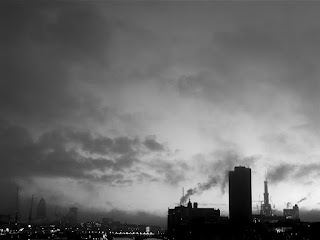At 17:45 the answer phone message changes to reveal the
address, “emergent service workers of the world unite…” is the command. I am
told to make my way to the party, at the garish coloured buildings on Saint
Giles High Street, and wished a happy May Day.
The setting is the new London headquarters of Google, who
occupy five floors of the Central Saint Giles redevelopment, a place where
residential and retail possibilities combine to make “more than an office
building”. The premises are managed by Stanhope PLC, and are the sort of
location preferred by the party organisers, who call themselves Space
Hijackers. Self-identifying “middle class art school wankers”, the group peddle
a playfully subversive politics; they daubed black paint across a dozen BP
billboards prior to the Olympics, they have organised games of cricket in
private developments of public space.
The crowd is clean-cut, some partygoers have arrived with
their families, children are dressed in fencing masks and are using keyboards
as foils. A keyboard maypole is wheeled in on a cargo bicycle, and May Day
observers in white jumpsuits begin to dance around it with computer cables. A
small-time drug dealer shuffles through the crowd trying to sell wraps of
cannabis, off to one side, a familiar-looking band of freelance photographers
have made the short journey from where I’m used to seeing them, waiting for
celebrities at the BBC studios on Great Portland Street. They stand about in utility
waistcoats and hooded sweaters, looking altogether disappointed with the small
turnout. One by one, they take it in turns to visit a nearby café.
I arrive with the fundamental misgiving of whether a modern
May Day is a cause for celebration or commiseration. The organisers refer to
the event as an “after party”, their flier a wandering but lyrical complaint
against workfare and overtime, they joke that the campaign for an end to the
wage economy has been left half-finished, with the economy still intact and
only the wages removed. In Turkey, I hear 27,000 police had been deployed that
morning on the streets of Istanbul. Tear gas was fired, authorities suppressed
turnout by cancelling public transport to the area. In Central Saint Giles, the
Worker’s Day protest is suffering a distinct lack of workers.
The altogether strange environment is leant a final eeriness
by the empty buildings, the bare concrete without interior. Most of St Giles’
ground floor premises have been filled with a pastiche of Latin or
Mediterranean dining culture, but overhead and all around, quite clearly there
are vacant lots. In Ground Control,
her chronicle of the privatisation of public space, Anna Minton opens with the admission
that the manuscript had been conceived of in a boom and written in a bust. She talks
of how investors jumped at the promises of new developments, only to dry-up as
the financial crisis came about. A party organiser passes me by, clutching an
armful of beer cans, and I watch the Space Hijackers as they dance around their
maypole, in the shadow of what looks like a development failure. From a corner,
a unified screech rises momentarily above the volume of the sound system… “We love Google!”… from a group of women
sitting outside a franchise Italian restaurant. The head of building security marches
into the huddle of partygoers, he shouts orders into a phone, reprimands the masked
children for fencing with keyboards.


No comments:
Post a Comment